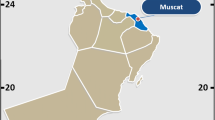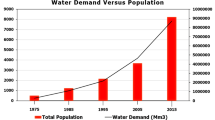Abstract
The reuse of treated wastewater, whether direct or indirect, can raise public concerns as a result of the overall risk perception. As such, community acceptance plays a significant role in the implementation of alternative water systems. Public attitudes towards water reuse are highly influenced by perceived health risk, religious prohibition, political issues, and the degree of human contact with recycled water. In most of the Mediterranean countries, wastewater is reused to different extents either within planned or unplanned schemes. Unfortunately, there are few in-depth studies of the socio-cultural aspects of reuse projects in developing countries, and Lebanon is no exception. Accordingly, this research will comprehensively tackle the issue of public knowledge, perceptions, and acceptance from different perspectives in an effort to provide national baseline information on wastewater reuse that is needed for future regulatory and developmental projects. As such, a survey was developed, tested, and administered. Results showed an inverse relation between the degree of human contact with the treated wastewater and public acceptance. People were found to be more inclined towards reuse for purposes with minimal human contact such as landscaping and agriculture with opposition when it came to use for personal use. Moreover, the results showed a general lack of trust in governing institutions and authorities, which could explain perceived health risks and perceptions of risk resulting from system failure. Overall, the willingness to use treated wastewater was found to vary as a function of the “disgust factor,” religious beliefs, and perceptions of a high risk towards contracting waterborne diseases. The disgust towards reuse of treated wastewater was found to be a strong predictor affecting willingness to reuse whereby those who believed it is disgusting to reuse treated wastewater were found to be on average, three times less likely to reuse treated wastewater as compared to those who did not declare disgust. Similarly, a significant association was found between religious beliefs and respondents’ willingness to use treated wastewater. Interviewees who thought treated wastewater reuse is not religiously accepted were, on average, twice less likely to use treated wastewater as compared to those who did not believe that reuse contradicts with their religious beliefs. Additionally, people’s perceptions on associating the spread of water-borne diseases with reuse were found to be significant. Those who perceived that reusing treated wastewater would lead to diseases and affect the human health, were on average, twice less likely to accept reuse. Developing a comprehensive strategy that integrates increasing awareness and knowledge, setting policies related to water reuse, building public trust and communication channels, increasing public participation/engagement in decision making, and developing a sustainable management framework is thus crucial before any investments are made in reclaimed water-reuse projects.



Similar content being viewed by others
References
Ahmad, S. (1991). Public attitude towards water and water reuse. Water Science & Technology, 23(10–12), 2165–2170.
Alhumoud, J., & Madzikanda, D. (2010). Public perceptions on water reuse options: the case of Sulaibiya wastewater treatment Plant in Kuwait. International Business & Economics Research Journal, 9(1), 141–158.
Baggett, S., Jeffrey, P., & Jefferson, B. (2006). Risk perception in participatory planning for water reuse. Desalination, 187(1–3), 149–158.
Bakopoulou, S., & Kungolos, A. (2009). Investigation of wastewater reuse potential in Thessaly region, Greece. Desalination, 248, 1029–1038.
Bakopoulou, S., Polyzos, S., & Kungolos, A. (2010). Investigation of Farmers’ willingness to pay for using recycled water for irrigation in Thessaly region, Greece. Desalination, 250, 329–334.
Buyukkamcia, N., & Alkan, S. (2013). Public acceptance potential for reuse applications in Turkey. Resources, Conservation and Recycling, 80, 32–35.
Chen, W., Bai, Y., Zhang, W., Lyu, S., & Jiao, W. (2015). Perceptions of different stakeholders on reclaimed water reuse: the case of Beijing, China. Sustainability, 7, 9696–9710.
Dishman, C. M., Sherrard, J. H., & Rebhun, M. (1989). Gaining public support for direct potable water reuse. Journal of Professional Issues in Engineering, 115(2), 154–161.
Dolnicar, S., & Schafer, A. I. (2009). Desalinated versus recycled water: public perceptions and profiles of the accepters. Journal of Environmental Management, 90, 888–900.
Dolnicar, S., Hurlimann, A., & Grun, B. (2011). What affects public acceptance of recycled and desalinated water? Water Research, 45, 933–943.
Drechsel, P., Mahjoub, O., Keraita, B. (2015). Social and cultural dimensions in wastewater use. Chapter 5, In: P. Drechsel, et al. (Ed.), Wastewater: economic asset in an urbanizing world. Springer Science+Business Media, Dordrecht 2015, 86–96. pp. 75–92.
Fielding, K. S., & Roiko, A. H. (2014). Providing information promotes greater public support for potable recycled water. Water Research, 61, 86–96.
Friedler, E., Lahav, E., Jizhaki, H., & Lahav, T. (2006). Study of urban population attitudes towards various wastewater reuse options: Israel as a case study. Journal of Environmental Management, 81, 360–370.
Garcia-Cuerva, L., Berglund, E., & Binder, A. (2016). Public perceptions of water shortages, conservation behaviors, and support for water reuse in the U.S. Resources, Conservation and Recycling, 113, 106–115.
Gu, Q., Chen, Y., Pody, R., Cheng, R., Zheng, X., & Zhang, Z. (2015). Public perception and acceptability toward reclaimed water in Tianjin. Resources, Conservation and Recycling, 104, 291–299.
Hurlimann, A. C., & Dolnicar, S. (2016). Public acceptance and perceptions of alternative water sources: a comparative study in nine locations. International Journal of Water Resources Development, 32(4), 650–673.
Hurlimann, A. C., Hemphill, E., McKay, J., & Geursen, G. (2008). Establishing components of community satisfaction with recycled water use through a structural equation model. Journal of Environmental Management, 88(4), 1221–1232.
Ishikawa, K. (1968). Guide to quality control. Tokyo: JUSE.
Jefferson, B., Palmer, A., Jeffrey, P., & Judd, S. (2004). Grey water characterization and its impact on the selection and operation of technologies for urban reuse. Water Science & Technology, 50(2), 157–164.
Kamizoulis, G., Bahri, A. Brissaud, F. and Angelakis, A. N. (2003). Wastewater recycling and reuse practices in mediterranean region: recommended guidelines. 2003.
Kantanoleon, N., Zampetakis, L., & Manios, T. (2007). Public perspective towards wastewater reuse in a medium size, seaside, Mediterranean City: a pilot survey. Resources, Conservation and Recycling, 50, 282–292.
Krejcie, R., & Morgan, D. (1970). Determining sample size for research activities. Education and Physiological Measurement, 30, 607–610.
Lam, S., Nguyen-Viet, H., Thi Tuhey-Hanh, T., Nguyen-Mai, H., & Harper, S. (2015). Evidence for public health risks of wastewater and excreta management practices in Southeast Asia: a scoping review. International Journal of Environmental Research and Public Health, 12, 12863–12885.
Lautze, J., Stander, E. Drechsel, P. Da Silva, A. K. and Keraita, B. (2014). Global experiences in water reuse. Colombo: International water management institute (IWMI). CGIAR Research Program on Water, Land and Ecosystems (WLE). 31p. (resource recovery and reuse series 4).
Leovy, J. (1997). Reclaimed wastewater may ease State’s thirst. Los Angelo’s Times.
Madany, I., Al-Shiryan, A., Lori, I., & Al-Khalifa, H. (1992). Public awareness and attitudes toward various uses of renovated water. Environmental International, 18(5), 489–495.
Nancarrow, B., Leviston, Z., Po, M., Porter, N., & Tucker, D. (2008). What drives communities’ decisions and behaviors in the reuse of wastewater. Water Science and Technology, 57(4), 485–491.
Nijhawan, A., Labhasetwar, P., Jain, P., & Rahate, M. (2013). Public consultation on artificial aquifer recharge using treated municipal wastewater. Resources, Conservation and Recycling, 70, 20–24.
Okun, D. A. (2002). Water reuse introduces the need to integrate both water supply and wastewater management at local regulatory levels. Water Science & Technology, 46(6–7), 273–280.
Pham, T. T. N., Ngo, H. H., Guo, W., Dang, H. P. D., Mainali, B., Johnston, A., & Listowski, A. (2011). Responses of community to the possible use of recycled water for washing machines: a case study in Sydney, Australia. Resources, Conservation and Recycling, 55, 535–540.
Po, M., Kaercher, J., & Nancarrow, B. (2003). Literature review of factors influencing public perceptions of water reuse. Melbourne: CSIRO Land and Water.
Po, M., Nancarrow, B.E., Levistin, Z., Porter, N.B., Syme, G.J. and Kaercher, J.D. (2005). Predicting community behavior in relation to wastewater reuse: what drives decisions to accept or reject? Water for a healthy country National Research Flagship, CSIRO Land and Water, Perth.
R Core Team (2013). R: A language and environment for statistical computing. R Foundation for Statistical Computing, Vienna, Austria. http://www.R-project.org/. Accessed 14 Sept 2017
Rice, J., Wutich, A., White, D., & Westerhoff, P. (2016). Comparing actual de facto wastewater reuse and its public acceptability: a three city case study. Sustainable Cities and Society, 27, 467–474.
Ross, V. L., Fielding, K. S., & Louis, W. R. (2014). Social trust, risk perceptions and public acceptance of recycled water: testing a social-psychological model. Journal of Environmental Management, 137, 61–68.
Sims, J. H., & Baumann, D. (1974). Renovated wastewater: the question of public acceptance. Water Resources Research, 10(4), 659–665.
UNEP, United Nations Environment Programme. (2008). Vital water graphics: an overview of the world’s fresh and marine waters, 2nd ed. Retrieved on 23 May, 2015 from http://www.unep.org.
Venables, W. N., & Ripley, B. D. (2002). Modern applied statistics with S (4th ed.). New York: Springer.
igneswaran, V., & Sundaravadivel, M. (2004). Recycle and reuse of domestic wastewater. In S. (. V.). Vigneswaran (Ed.), Wastewater Recycle, Reuse, and Reclamation. Oxford: Encyclopedia of Life Support Systems (EOLSS), Developed under the Auspices of the UNESCO, Eolss Publishers.
Wester, J., Timpano, K. R., Cek, D., & Broad, K. (2016). The psychology of recycled water: factors predicting disgust and willingness to use. Water Resources Research, 52, 3212–3226.
Wester, J., Kiara, R., Timpano, D., Lieberman, D., Fieldstone, S., & Broad, K. (2015). Psychological and social factors associated with wastewater reuse emotional discomfort. Journal of Environmental Psychology, 42, 16–23.
Wilson, Z., & Pfaff, B. (2008). Religious, philosophical and environmentalist perspectives on potable wastewater reuse in Durban, South Africa. Desalination, 228(1–3), 1–9.
World Bank. (2010). Improving wastewater use in agriculture: an emerging priority. Energy Transport and Water Department.
Funding
This research project is funded by the American University of Beirut Research Board.
Author information
Authors and Affiliations
Corresponding author
Rights and permissions
About this article
Cite this article
Massoud, M.A., Kazarian, A., Alameddine, I. et al. Factors influencing the reuse of reclaimed water as a management option to augment water supplies. Environ Monit Assess 190, 531 (2018). https://doi.org/10.1007/s10661-018-6905-y
Received:
Accepted:
Published:
DOI: https://doi.org/10.1007/s10661-018-6905-y




